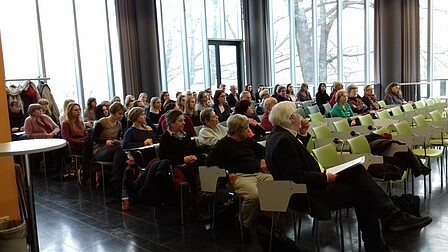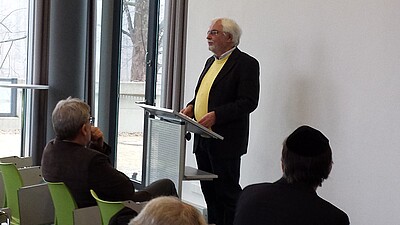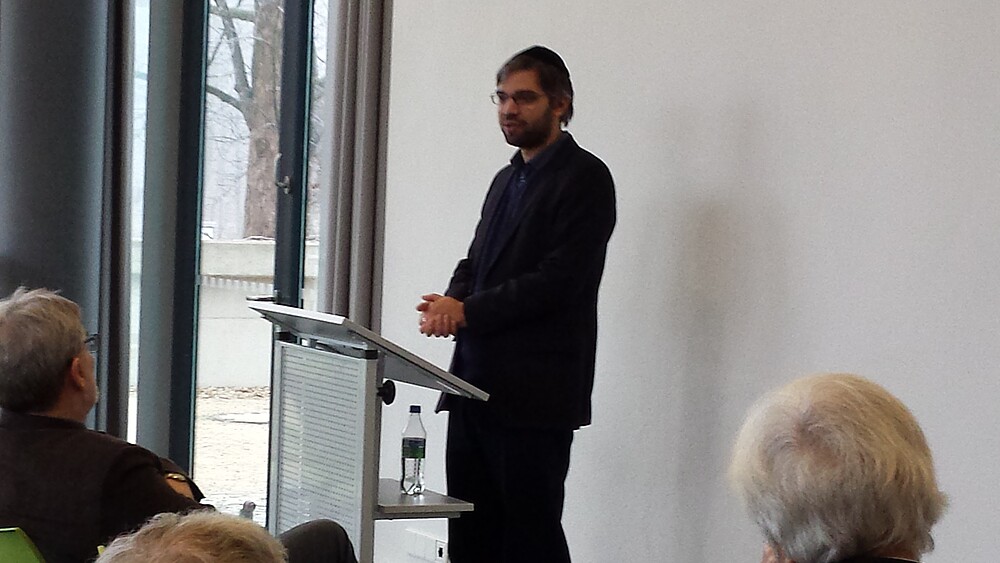As part of a research seminar on Jewish life and the Jewish heritage of the city of Görlitz, led by Dr. SławomirTryc and Rainer Michel, the director of the House of Literature in the Old Synagogue in Görlitz, a meeting with Alexander Nachama, the rabbi of the Jewish community in Dresden, took place on 20.12.2016 in the Görlitz auditorium of the university.
Nachama, who was appointed to the post in 2013 at the age of 29, comes from a famous family of cantors and rabbis with Sephardic roots ; his grandfather Estrongo was head cantor of the Jewish community in Berlin, his father Andreas is also a rabbi, as well as a well-known historian, professor and director of the Topography of Terror Foundation in Berlin.
Alexander Nachama first trained as a cantor at and in 2008 he received a Bachelor's degree in Jewish Studies (FU Berlin). In order to fulfill a long-held wish, he completed a course at the Abraham Geiger College, an affiliated institute of the University of Potsdam, from 2007.

Nachama, the Dresden Jewish community's first rabbi in 74 years, has a great deal of work ahead of him. Around 1900, the Jewish community in Dresden had over 5,000 members. After 1945, only 41 Jews still lived in the city. Today many of the approximately 700 members of the community come from the former Soviet Union. The community must grow together.
In a lively discussion, Alexander Nachama dealt with the fundamental questions of Judaism, e.g. the tension between tradition and modernity, between orthodox and liberal. Tradition is very important in Judaism and is not only present again in synagogues, but also on the streets of cities in many European countries. It may not yet be a real renaissance, but it is a fundamentally happy "coming out". In Germany, for example, Hanukkah, the festival of lights, with the largest menorah in Europe in front of the Brandenburg Gate has now become a tradition. Or festivals of Jewish culture in neighboring Poland, which became the religious center of European Jewry due to a long period of spiritual tolerance. Before the Second World War, 3.3 million Jews lived in Poland, making up around 10% of the total population. Today the Jewish Cultural Festival in Krakow , which has been held annually since 1988, is one of the largest festivals of its kind in the world.

In addition, Rabbi Nachama revealed the secrets of the rites, customs and symbols of Judaism to the numerous students and Görlitzers during the question and answer session, which lasted almost an hour and a half, answered questions about everyday concerns of the Jewish community in Dresden, e.g. problems with new recruits (only one person comes from Görlitz), security or relations with other religions. There was also a lively exchange of opinions, experiences and information among the audience on the subject of Jewish communities in the GDR.
Contact:
Dr. Slawomir Tryc
Hochschule Zittau/Görlitz
Faculty of Management and Cultural Studies
Phone: +49 3581 374 4350
e-mail: S.Tryc@hszg.de
Photos: Prof. Dr. phil. Malgorzata Schulz, Dr. Slawomir Tryc

